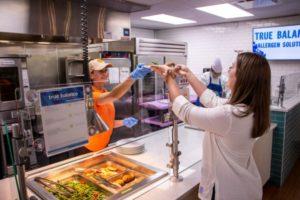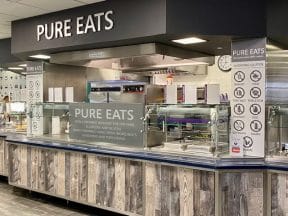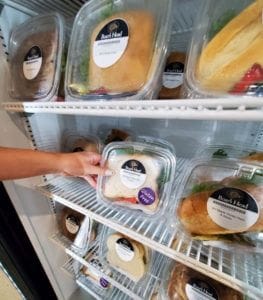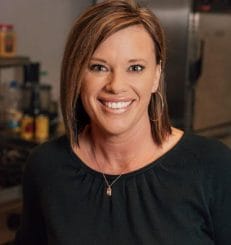At 4 Colleges, Food-Allergic Students Get Taste of Inclusion - Allergic Living
The sizzle of chicken, onion, cilantro, and carrots is a welcome sound as Pranav Bajaj watches a chef whip up a tasty stir-fry dish just for him. The allergy-friendly meal, prepared with his choice of ingredients at a Northwestern University dining hall, was always a favorite dish for the college student.
"Stir-fry is not something I would generally consume anywhere else. That's super special," says Bajaj, of Racine, Wisconsin.
Bajaj, who has multiple food allergies, feels safe eating meals prepared for the Pure Eats stations in all of Northwestern's dining halls. This is because they are free of the top 9 allergens (peanuts, tree nuts, wheat, milk, egg, soy, shellfish, fish and sesame). He also is confident in the measures the dining staff takes to ensure that the meals are free from cross-contact.
"It was almost like I was like any other person. I could just walk into any dining hall and eat with my friends. It's huge. It gave me so much freedom," says Bajaj, who finished his undergrad and is now a medical student at Northwestern's Feinberg School of Medicine in Chicago.
Instilling that sense of independence while providing safe dining options for food allergies, celiac disease, and other dietary restrictions is central to the success of colleges across the United States that accommodate students' dietary needs.
Extra Mile for Students' Food Allergies
The strategies they employ to keep students with special diets safe, while providing nutritious, tasty and convenient food choices, include:
- Strict protocols. For example, using dedicated utensils for allergy-friendly foods, and having food-service employees serve the diners, instead of allowing self-serve.
- Allergen training and certification programs. Schools partner with outside allergen training companies, such as MenuTrinfo and FARECheck, along with creating their own training program specific to the university.
- Communication. Students need to tell the dietitian and food services staff about dietary needs before they arrive on campus and throughout the school year. It's also important to register with the disability services office.
- Transparency. Nutrition information about menus and ingredients is posted online and in dining areas.
Allergic Living examines four colleges that include all those measures while going the extra mile to accommodate students with food allergies and celiac disease. They are: Clemson University in Clemson, South Carolina; Cornell University in Ithaca, New York; Northwestern University in Evanston, Illinois; and Texas Tech University in Lubbock, Texas.
Clemson University
Free-from dining options: Schilletter Dining Hall includes the True Balance Allergen Solutions station, which is free of the top 8 allergens. The Dish at McAlister has the Naked Food Station, which is gluten-free. A chef-prepared meal program, which tailors the food to meet a student's specific needs, also is available. The Campus Dish website features menus. Labels also highlight vegan and vegetarian meals.
Alex McNair had worried that she wouldn't be able to find enough food to eat at Clemson as a student with celiac disease. But when she met with the school's registered dietitian Shannon Greene before her freshman year, she was assured that she would be taken care of. Especially helpful to her are the gluten-free Naked Food Station and the top 8-free True Balance Allergen Solutions station.

Every day, McNair checks what is being served at those two stations on the Campus Dish website. Greene says some favorite dishes at True Balance include lasagna, tacos, turkey burgers and chicken tenders. Gluten-free pizza, French fries, and chocolate chip cookies are popular items at the Naked Food Station.
"There were so many options for me, it was beyond belief. I felt completely safe eating in the dining hall," says McNair, now a graduate student in Food Science and Human Nutrition.
Greene encourages students to work with her on a plan of action, to determine whether they can eat from the allergy-friendly stations or need meals specifically prepared. "We do our best to accommodate all dietary restrictions on an individual basis," she says.
Rigorous precautions are key to keeping True Balance safe, she says. Measures include: training for all managers, supervisors and True Balance staff; daily checks of the station with monthly audits; and procedures to keep all food, storage and preparation areas separated from the rest of the dining hall.
McNair saw the allergy protocols in action, since she had a job at the allergy stations as a student nutrition lead during her undergrad studies. "They handled cross-contact really well," says the student from Greenville, South Carolina.
Clemson partners with MenuTrinfo and has achieved the company's AllerCheck certification. This certification involves a neutral food safety expert visiting the campus to review a required 27 checkpoints, which cover training, posters, handling utensils and pans, recipes, cleaning, and managing food from the loading dock to the plate being served.

AllerCheck was launched in 2021 by MenuTrinfo, a longtime leader in food allergy and gluten-free training. It offers courses for food handlers accredited by the American National Standards Institute (ANSI), and expert knowledge of commercial kitchens and allergy-friendly meal preparation.
"The AllerCheck certification is so important because it gives our station another layer of safety and assuredness," says Greene. As a master trainer, she teaches MenuTrinfo's accredited AllerTrain program to Clemson staff. This involves education on food allergies and gluten-free needs, protocols for preventing cross-contact, and how to recognize and treat a severe allergic reaction.
Clemson is among close to 100 locations served by Aramark food service company with True Balance stations. These stations all have AllerCheck certification and ANSI-certified staff training through AllerTrain education, says Betsy Craig, MenuTrinfo's president and CEO.
"The training is so valuable," says Greene. "It ensures everyone in our organization receives the same detailed training."
Cornell University
Free-from dining options: Risley Hall is free of peanuts, tree nuts, gluten. All menu items in dining halls are labeled for the top 9 allergens and gluten. Vegan, vegetarian, kosher and some other religious diets accommodated. Chefs can make individual meals as needed. Cornell Dining's NetNutrition website features menus and ingredient information.
Sophomore Kayla Singer enjoys eating fried foods, and even ice cream and desserts without fear of cross-contact at Cornell's Risley Hall. The dining hall is free of peanuts, tree nuts and gluten. "I can eat there without worrying about my allergies, which is a major plus," says Singer, who is allergic to peanuts and tree nuts.

"Risley Hall offers an exciting menu and is a popular location for students without food allergies," says Michelle Nardi, the campus's registered dietitian nutritionist. Favorite dishes at Risley include tostadas, homemade Smashburgers, and made-to-order stir-fry.
The hall is certified peanut-free, nut-free and gluten-free through a MenuTrinfo program called Kitchens with Confidence. KWC certification, which many restaurants and food makers undertake as well, is rigorous. It involves in-depth auditing, plus testing of dining prep practices, including measures to avoid cross-contact.
"Having third-party certification provides an additional level of assurance to guests that we have procedures in place to keep them safe," Nardi says.
Singer, who is majoring in applied economics, also feels comfortable eating at Cornell's other dining halls because of allergy safety efforts. She doesn't eat the fried foods or ice cream outside of Risley, due to the cross-contact risk (warning signs remind her).
But thanks to the NetNutrition website and posted signs highlighting the top 9 allergens, she easily finds safe foods. "Everything is so clearly marked for my allergens," says Singer of Chappaqua, New York.

The dining staff, including student employees, all receive training through AllerTrain.The college uses AllerTrain U, which teaches how to recognize symptoms of an allergic reaction in addition to dining hall procedures to help prevent reactions. Nardi says a benefit of the AllerTrain U training is that is tailored to the university experience, not just restaurant dining.
"We have an extremely talented culinary team, and we pride ourselves on our ability to provide safe meals for our guests with food allergies and restrictions that are delicious and nourishing," Nardi says.
Students can work with Nardi to develop a specialized plan to address their dietary needs, schedule and personal preferences. When necessary, dining team also offers customized meals that are as similar as possible to meals everyone else is enjoying, she says.
"Sharing meals and memories with friends over delicious food is an important part of the Cornell experience, and we want to make sure all our guests can participate," Nardi says.
Northwestern University
Free-from dining options: All dining halls at the Evanston campus have Pure Eats stations, which are free of top 9 allergens. Peanuts and tree nuts (including any nut products) are not used for cooking in the dining halls. However, the halls are not considered peanut- and nut-free since some products could be manufactured in the same facility as nuts. Vegan, vegetarian, kosher and some other religious diets accommodated. Dine on Campus app and website features online menus and ingredient information.
At Northwestern, registered dietitian nutritionist Lisa Carlson stresses that providing students the opportunity to enjoy safe meals with friends is important. "We are trying our best to have a strong food allergy program, and a delicious food program that serves all students," she says.

All four dining halls include top 9-free Pure Eats stations. The popular made-to-order stir-fry is featured at Foster-Walker East dining hall, which exclusively serves Pure Eats fare. Gluten-free pasta meals are also a favorite at all Pure Eats locations. "The response to Pure Eats has been very positive," Carlson says.
Student Bajaj even had a strategy for eating elsewhere. He'd fill up a to-go container at Pure Eats so that he had something safe to eat when dining with friends at a campus location that didn't serve food free of his allergens.
Late-night cravings pose another challenge, as the allergy-friendly dining halls aren't open late. So he kept a refrigerator in his dorm room, stocked with meals from home.
Bajaj credits his ease in navigating campus dining to his relationship with the dietitian and chefs. When they arrive, Carlson introduces students to the dining staff. She also helps them learn to navigate the Dine on Campus app to review ingredients. "It's a lot easier to have a familiar face in the dining hall if you need something," Bajaj says.

To Carlson, allergy education is vital. Chefs must not only be knowledgeable about the ingredients, but also about ensuring food for allergic students is prepared safely. The Compass Group's Chartwells food-service company serves Northwestern. It follows the FARECheck program to train its culinary team in proper food allergy handling and safety practices. The dining staff completes the online FARECheck training, established by the nonprofit FARE (Food Allergy Research & Education).
Learning about cross-contact, such as visualizing flour flying around while making bread, are essential parts of the training, Carlson says. In addition, she conducts in-person training twice a year that she developed for her staff. Her presentations include a video of Northwestern students explaining what it's like to eat on campus with food allergies, along with scenario situation discussions.
Texas Tech University
Free-from dining options: Gluten-free, vegan and vegetarian options available and labeled throughout the dining locations. Top 9 allergens and gluten, along with pork, are labeled in the dining halls and online. SmartChoices nutritional website features online menus and ingredient information.
Education is essential to ensuring that students with food allergies are safely served at Texas Tech, says Mindy Diller, the campus registered dietitian. It is key to the school's Smart Choices Wellness Program, which encompasses several levels of allergy training, educational signs, and special equipment to reduce cross-contact. For example, posters featuring "HUGS" (use clean Hands, Utensils, Gloves, and Surfaces) are reminders for staff.

Another central component in reducing cross-contact is the Purple Program. Purple equipment such as purple gloves, cutting boards, and utensils serve as a visual cue for staff when preparing allergy-friendly food, Diller says. "Creating a safe environment for students and staff is why I am here," she says.
All new employees receive basic allergy training when hired; and the upper-level hospitality management completes MenuTrinfo's AllerTrain program. Diller also requires that dining staff complete yearly allergy training that she developed, specific to the needs of students with allergies and dietary needs at Texas Tech.
The training has also been helpful when it comes to addressing supply chain issues and product substitutions. For example, the staff knows to look for a substitution that could introduce an allergen where it is not expected, such as marinara sauce that contains dairy.
Menu information on the SmartChoices website helps Texas Tech students like senior Kylie Rogers, who is allergic to peanuts and pistachios. The psychology major checks the nutrition facts on the site before going to eat, and she is happy to find great salads and safe bagels in her favorite dining hall, The Commons.

Rogers had been concerned that she would not have many food choices. But she was reassured once she worked with Diller to learn about safe options, and a detailed list of safe places to eat. "Mindy always kept in contact with me. It's really nice knowing that Texas Tech is on top of this and wants to make sure everyone feels comfortable," says Rogers of Waco, Texas.
Diller invites students with allergies to meet with her in dining locations so that they can meet the staff, look at the packaging and ingredients, discuss preparation techniques to reduce cross-contact, and address any other concerns.
"As an advocate for food allergies for students and our staff, my personal goal is to help build connections and promote the success of our Red Raiders," Diller says.
Speak Up About Food Allergies
The connections students make can help them successfully navigate college life with food allergies. Whether with food service staff, friends, or roommates, or the need to speak up about special dietary needs is paramount.
Clemson student McNair stresses the importance of getting to know the dining staff, who are doing their best to provide safe options and a safe environment. But it's a shared responsibility, and you need to keep raising your allergies. "You are also responsible for your food allergy. Advocate for yourself," she says.
Cornell student Singer benefited from a candid discussion with her roommate before they moved in together. Their agreement about keeping nuts out of the dorm room made Singer feel comfortable.
"Communication and education are key!" says Cornell dietitian Nardi. "Let your roommates and friends know about your dietary restrictions. Be clear with them about how they can help keep you safe."
Northwestern's Carlson agrees. "There are ways students can advocate for themselves, stay safe and have a great college experience," Carlson says.
She notes that there will always be social activities centered on food, so educating the people you are with about your allergies, how to recognize the signs of an allergic reaction and how to treat it are important. "These are the people who can help you," Carlson says.
Related Reading:
College Corner: Allergic Living Section on Campus Living
Food Ordering App That Meets Allergic Needs

Comments
Post a Comment